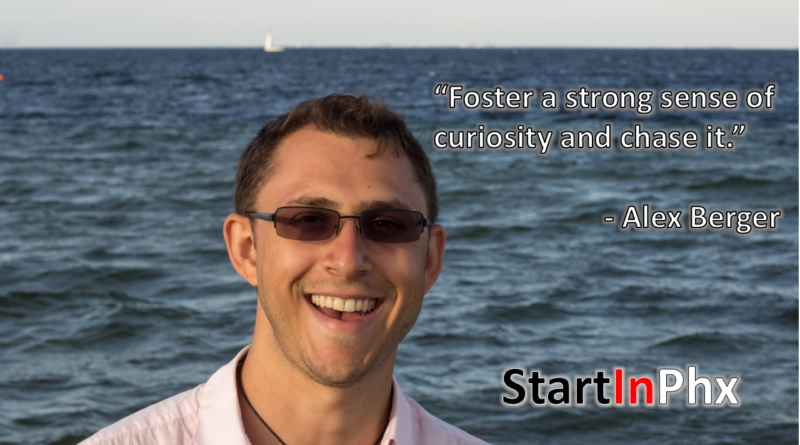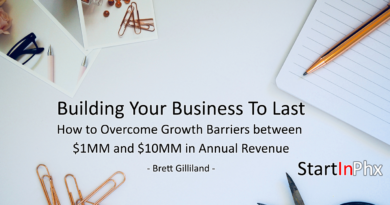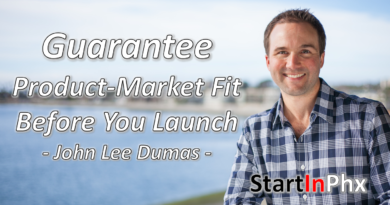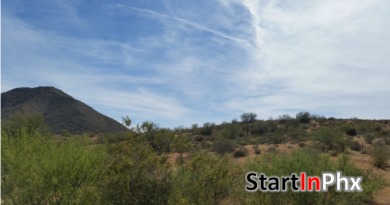A Career in Professional Marketing and Semi-Pro Blogging
Alex Berger is product marketing manager for Adform, an advertising technology company based in Denmark.
In addition to his full-time job, Alex combines his passions for travel and photography with his professional skill-set to monetize a blog that documents his international adventures.
Alex’s photography has been featured by National Geographic, but a more extensive collection of his work can be seen at Alex-Berger.com and @VirtualWayfarer on Instagram.
After graduating from Arizona State University with an undergraduate degree in human communication, Alex set out to travel the world before settling into his first full-time job back in Arizona. Only a few year later would Alex set out to pursue a master’s degree, but this time his studies and career pursuits took him much farther from home.
Career Success Q&A
What do you do for work?
I own and operate the independent travel blog, VirtualWayfarer.com, which I’ve run since 2007.
My primary source of income and occupation, however, is as Product Marketing Manager, Supply for Adform. What that means is that I am responsible for Adform’s – we’re Europe’s largest independent ad tech company- publisher facing marketing. Which ranges from our website and social channels to sales materials, product launches, webinars, and everything in between.
[Adform] is a late-stage startup, with Danish founders based in Copenhagen, but with a large global presence; offices in 18 countries and nearly 800 employees with YOY growth of 200 or so new faces.
How long have you worked in this role?
I joined [Adform] in February 2015
What do you like most about your job?
It’s fascinating working with a global team that is young, highly energetic, and in an industry that spans from big data to massive exchanges, not dissimilar to the technologies driving the NYSE.
All the while, getting insights into how publishers monetize, and what goes into the technologies that have enabled a free internet.
What kind of formal schooling or training do you have?
[I have a] bachelor’s in human communication from Arizona State University and Barrett Honors College.I started at ASU as pre-business, and after completing pre-requisites transferred to human communication due to the absolute lack of anthro-humanistic-psychological focus within the business school and the nonsensical obsession with pseudo-libertarianism.
I graduated in 2007. Went and traveled for 3 months. Came back [to Arizona] and worked for 3.5 years.
Eventually, decided I wanted to pick up a master’s [degree], decided to re-locate for it as I was tired of Arizona. I pulled up a list of the top 50 universities globally, vetted them based on interesting locations and universities with communication programs.
Eventually I had a list of eight: four PhD and four MA programs. Some in the US, some abroad. I was admitted to two MA programs: Georgetown and University of Copenhagen. Georgetown wanted full tuition, University of Copenhagen offered a tuition waiver.
So, I relocated to Denmark and did my MA (or in Danish Cand.Mag) in cognition and communication. I finished the MA in 2 years (on schedule) with a final thesis grade of 12 (perfect).
During the MA, I also had the opportunity to leverage some of my MA research on travel and tourism, and to publish it in various peer reviewed journals.
What kind of experience did you have before you began your current position?
One of the things missing from my resume is a proper student job in high school. I had one summer job at a book/music/video rental store.
Beyond that, I was lucky in that my parents felt I should be able to focus on my studies if I wanted to. That had some key advantages and blessings, though I also never picked up some of the other skills and insights that come from working more menial jobs.
For a few years I also did very limited freelance web design on the side, for a few small groups.
My first job was a paid summer internship in research/mapping/GIS and eventually IT at a major commercial real estate firm. That grew into a full-time student job at 20 hours a week during the school year, and a full-time job during the summers. I worked there throughout college and left the role in September 2007 after graduating, so that I could travel Europe for 3 months.
Before I left for the trip, I was referred to a role at Fox and Fin Financial, a small but highly respected mid-market mergers and acquisitions company in Scottsdale. I accepted the role and worked there from when I returned in January 2008 – for 3.5 years – until I left for Copenhagen.
Due in part to my experience – and in part to ego – I refused to take an unpaid internship during my MA. Afterwards while searching for a job in Copenhagen’s very difficult job market I accepted one fixed term, 2 month sick leave cover, for the then head of communications for Maersk Global.
Later, I took a 3 month paid student job at Biogen, the biotech company, doing employer presence and branding as part of [human resources].
Throughout it all I ran VirtualWayfarer.com, which is the travel blog I founded in 2007.
During the MA my initial plan was to either launch FusionVirtual, a MMOG-based edtech concept, or to build my blog to a point where I could launch a career as a professional travel blogger.
I realized FusionVirtual was not ultimately feasible due to its startup costs, programming requirements, and other general barriers including the rise of tablets.
I still run VirtualWayfarer, and make some money off of in a semi-professional capacity. But, I realized that professional travel blogging was like launching a magazine startup on top of a full time travel schedule. The lifestyle realities were vastly different than the glorified stereotype and the path to monetization was still too immature.
Do you have a mission statement or a guiding philosophy for your career?
Pay it forward. Accept opportunities. Leave people better than you found them where possible, but be true to yourself.
I also love the saying, you are the sum of the five people you surround yourself with, so pick wisely.
I came to the conclusion a few years ago that there are people who are either what I call shit-happens people or if-only people. I don’t have time or much sympathy (though plenty of pity) for if-only people.
Shit-happens people are those who create, make, and leverage opportunities by saying yes and are usually viewed by if-only people as lucky. Shit-happens people are defined by acting – in place of freezing – and shrugging off setbacks or adversity.
Meanwhile, if-only people dwell on slights, perceived setbacks, and their [perceived] lack of opportunities or luck, which actually comes from their unwillingness to say yes to opportunities and/or to put themselves in situations that generate opportunity.
What excites you most about your career right now?
It’s a fascinating time to be in this industry, and I’m working for an incredible company.
Despite being almost 800 employees and with a now global footprint, we’re going head-to-head with giants like Google and Facebook. We’re operating in an industry that is infinitely more complex than the vast majority of people think, and it is involved in some of the most exciting machine-based performance, learning, and predictive modeling stuff out there.
While many within the industry and organization tend to specialize (by necessity) and have their knowledge reflect that limited focus, my role requires I generate an understanding of all of our products, the industry, and the players: advertisers, agencies, and publishers.
While online ads aren’t always the most beloved part of the internet, there is also truth in that they’re what keep the internet open and free. Do away with them and you need an alternative model, which likely involves pay-per-view or subscriptions.
It’s also very cool to be in a company working to overcome the negatives associated with digital advertising while still delivering and driving amazing technological advances and improvements in ads available.
What excites you about the future of your career?
I’m very relaxed and casually opportunistic about the future of my career. I’m not overly concerned about industry, jumping up the ranks, or titles. What excites me is an interesting role, where I’m learning with fantastic people, and have a nice mixture of responsibility at a healthy level, that allows me to continue working on my own personal passion projects and enjoy a travel-centric lifestyle.
Are you an avid reader of books?
I wish.
I don’t read business or self-help books. For reading, I suggest high-fantasy.
My main area of reading is high-Tolkein-esque-fantasy. I’ll periodically burn through a 500-1000 page book in the genre, but unfortunately that’s a rarity. Usually I only manage one or two a year while traveling.
I’ve read extensively in the [fantasy] genre, covering most of the major authors and series including, as you might guess, Game of Thrones/Song of Fire and Ice.
Beneath the light hearted and fantastical elements, you explore many socio-political-ethical issues, while also consuming content, [they are] typically written at a higher level than most other genres. That’s great for your vocabulary, mind, and provides excellent food for thought.
I also suggest widely that people familiarize themselves with a bit of cognitive science, anthropology, history, etc. as that well-roundedness fills in key gaps and blind spots while also enabling you to engage with and relate to a wider cross section of people.
Is there another type of media you regularly consume as a means of continuing your professional education?
I’ve picked up podcasts over the last year, and while I don’t do audiobooks, I listen to a few hours of podcast material every week during my commute. These are shows like Tim Ferriss‘, Star Talk (Neil deGrasse Tyson), A History of Rome, or Hardcore History by Dan Carlin which is spectacular.
I also read selectively – but in high volumes – from web media like the Economist, Foreign Policy, Phys.org, National Geographic, etc. I’m also a huge fan of the video interviews on Edge.org, and similar material where I can find it.
For my blog I read and skim general travel blogs and material.
I also consume a voracious amount of content via YouTube. Right now three of my favorites are Postmodern Jukebox, Sexplanations and DevinGraham.
Do you have a set of fundamental principles you follow as a conscious way of ensuring you’re always improving yourself professionally?
Be curious. Tackle new challenges when they come up and accept that sometimes downtime is needed. But, also be willing to say yes and to get out there and show up for things.
I’m not terribly organized and I put no stock in all of the itemized routines and various other hyper-effective stuff that lifehackers love to promote and talk about.
Frankly, I’m exhausted with what I’m already doing – in a good way – and I have more than enough on my plate to really keep me occupied. Any increase in efficiency there would be completely negated by exhaustion, or burnout, or lack of life balance.
One of my only routines is to Salsa 1-2 times a week. The physicality and social side is very good for me both physio-chemically and emotionally.
What is the best career advice you ever received?
Work to understand what interests and excites you. Above all foster a strong sense of curiosity and chase it. [Click to Tweet]
Also – don’t be a lazy idiot. People [quite often] supplement mild curiosity with absolute laziness and lack [a filter for their own] bullshit.
Who are your most influential mentors and why do you admire them?
My parents who exposed me to the world, who taught me how to be curious, how to be critical and who have changed the fabric of the world around them in wonderful ways. You can read a bit more about some of this on my blog.
My dance teacher at ASU, Larry Caves, who was much more than the person who introduced me to Ballroom, Latin and Swing. He taught me essential life and business skills that were as useful – if not more – than my public speaking courses. These helped with my self-confidence, presence, poise, ability to perform in a business environment, dating, social interactions and willingness to push my comfort zone.
Captain Jean-Luc Picard who may have been a TV character but embodies the ideals of a renaissance man and captured the essence of humanism, exploration, and action.
My colleagues when I was working at the [mergers and acquisitions] firm who were on average 40+ years older than me and who shared guidance, stories, advice and wisdom while treating me like an equal.
Neil Tyson for his dedication to communicating science, critical thought, and perpetuating knowledge while exploring how to structure that communication to reach and connect with his audience.
Cody Paris who took me under his wing for a series of collaborative research papers about travel and tourism and taught me how core pieces of academia worked.
Mrs. Walker, my high school civics teacher who operated the We The People constitutional debate program.
Do you regularly commit your goals to writing?
I have mental goals, but mostly I just have tasks I’m working on/towards. I can’t really be bothered with all the micky-mouse of writing it down and then punishing myself for not making this, or losing interest, etc.
I know what I need to do. I know what I want to do. And I know what I should be doing. If I choose not to, or am neglecting things, then that’s on me and I don’t need another reminder to regurgitate it. I do however, communicate some major goals to friends and peers which then helps foster those coming to fruition.
What are a few of your short-term and long-term career goals?
Short-term: Continue to expand my understanding of the ad tech industry and landscape. The technology and industry are both brutally complicated. Despite my existing knowledge, there’s major potential for more learning which will continue to translate into direct career development and benefits.
Long-term: Enjoy what I’m doing. Be OK with the days where when I go to work I just have to ‘work’ through stuff I may not enjoy, but which needs to get done. Keep the combination at a healthy level and retain balance.
In recent years I’ve become less concerned with climbing up the ladder and aiming for a leadership/managerial position and more focused on the ability to pursue my plethora of projects simultaneously.
What has been the biggest challenge you’ve faced over the course of your career?
As someone who is highly driven and pushed to succeed, I suffer from the classic and very common case of impostor syndrome.
I have to be very careful to pause and take full advantage and to contextualize my successes; to document them, versus just celebrating them in the moment and then proceeding while largely forgetting about them, or operating from a position where I’m feel as though I’m not as capable as others perceive me to be.
Perhaps the other big one was my recent job search in Denmark. For a variety of reasons, the search in Denmark – especially in my industry – is extremely long for most people (1-2 years). As someone who had previously had jobs fall in my lap, and who operated with the belief that people who didn’t find something within a matter of months were lazy or being incompetent, it was deeply humbling to learn that’s just not the case.
It was also very challenging having an excellent resume, great references, good work experience, but still going through interviews with nearly 20 companies, of which five advanced me to final rounds, out of hundreds of candidates each time only to get rejected. Often because I was either lacking team management experience, or because my resume made them concerned I was over qualified or overly creative for the roles.
It was emotionally challenging, financially challenging, and required I fundamentally cross-examine my goals. All of which was made even more challenging due to the fact that I knew I could find a job in a matter of a month or less if I returned to the US or went elsewhere. But, perseverance pays off and I learned an incredible amount during that period. Both about companies, people, and hiring, as well as about myself and my career needs.
Have you overcome this challenge? How did you do it?
I got input. I kept having conversations with mentors. I asked for and then applied feedback. I varied my approach. I honed my skill.
What have you found to work really well for fostering your own professional growth?
Just be curious. Be friendly. Be helpful. Be pro-active.
If you’re unreliable or difficult to work with, all the brilliance in the world won’t get you far. Keep your ego out of it and just focus on getting results.
Above all, and one thing I have to work on constantly, is being willing and able to confess your ignorance of a topic – or at least to pretend that ignorance is there – to foster learning and opportunities to gain new insights or to engage people. Invest in them – carefully and with good judgement – and it comes back ten-fold.
What is a professional challenge you’re still looking for a solutions to?
The biggest challenge for me is deciding how and where to split my focus while maintaining life balance.
Between work, my blog, my other creative projects, friends, dating, a social life, etc. – it’s very difficult to really strike the right balance. I’ve had some great successes with my blog and photography, but have yet to really break through with them… These are still things I’d love to see ‘click.’ I feel it is all a bit undervalued for the quality of content I’ve put out.
Do you now or have you ever had a journaling practice?
My blog is in essence an element of that. It has factored into getting several of my jobs and has opened up all sorts of amazing experiences. [It also serves] as a sounding board that inspires me to hone skills, from writing to photography and videography – absolutely.
Are you currently working on any projects readers should be aware of?
Lots of them.
The main ones though are my YouTube series, Denmark 101, which I’ve recently cross-launched as a podcast.
Also – VirtualWayfarer.com, including my photography and Instagram (@VirtualWayfarer).
What is the best way for people to connect with you?
VirtualWayfarer: www.VirtualWayfarer.com
Podcast: Denmark 101
Instagram: @VirtualWayfarer
Twitter: @AlexBerger
LinkedIn: LinkedIn.com/in/EdwardAlexanderBerger
Facebook: Facebook.com/AlexanderBerger
YouTube: YouTube.com/user/Glamdering
Alex Berger Photography: Alex-Berger.com
Email: alex@virtualwayfarer.com
(No phone calls please)
Have questions about your own professional development or the details of Alex’s career path?
Ask your questions in the comments below and we’ll be sure to help in anyway we can!
You can receive articles like this as well as other great content we suggest from around the internet directly to your inbox by subscribing to our weekly newsletter.





